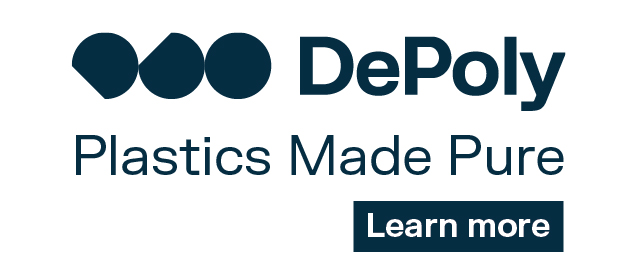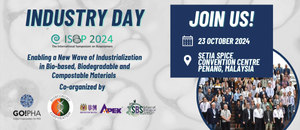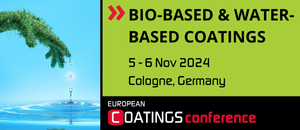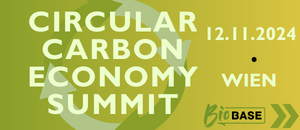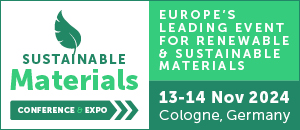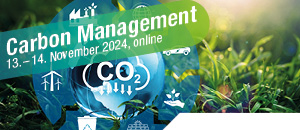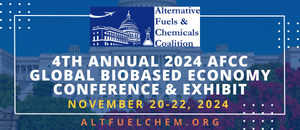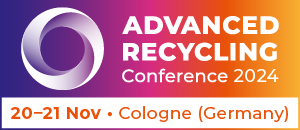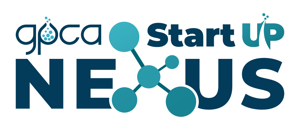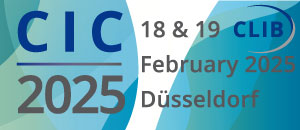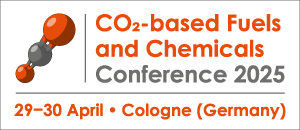The portfolio of nova-Institute’s market reports covers all relevant topics on renewable carbon. The reports dive deep into feedstocks for the chemical industry from biomass over CO2 to chemical recycling. They provide a comprehensive overview of bio- and CO2-based building blocks and polymers, the advanced recycling landscape, as well as specific polymers as PHA, comprehensive analyses of bio-based naphtha and the Mass Balance and Free Attribution Approach, biodegradability, guidelines, standards and labels for bio-based products. nova-Institute also offers reports on technology, policy, key players and the latest market data available.
The market and trend reports were compiled by nova scientists together with leading international experts and are among the most reliable and recognised sources on the market.
With the allowance code Winter2023 you get a 20% discount on 25 market reports.
All reports are available on https://renewable-carbon.eu/commercial-reports.
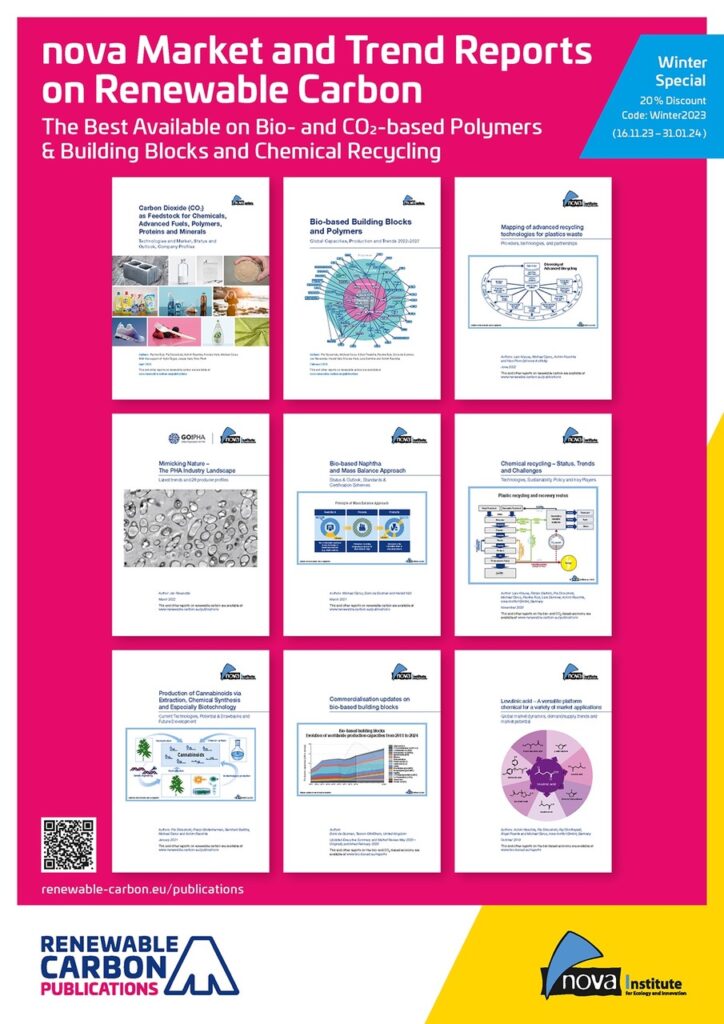
The offer includes, but is not limited to, the following comprehensive overview reports:
“Carbon Dioxide (CO₂) as Feedstock for Chemicals, Advanced Fuels, Polymers, Proteins and Minerals”
New report on the use of CO₂ for chemicals, advanced fuels, polymers, proteins and minerals by nova-Institute – A deep and comprehensive insight into the evolving technologies, trends and the dynamically growing market of CO2 transformation and utilisation.
Several successfully implemented technologies are now in commercial use, and many more are at the laboratory and pilot stage. A current total production capacity of novel CO2-based products of about 1.3 Mt/a in 2022 is observed. The production capacity in 2022 is dominated by the production of CO2-based aromatic polycarbonates, ethanol from captured CO/CO2, aliphatic polycarbonate and methanol. By 2030, the capacity outlook for CO2-based products is expected to exceed 6 Mt/a of CO2-based products. High dynamic growth is observed for methanol projects, methane plants, ethanol and hydrocarbons – the latter especially for the aviation sector.
The potential of CCU has been recognised by several global brands which are already expanding their feedstock portfolio. However, in Europe, investments and prospects for CO2 utilisation are largely undermined by a lack of political support. In contrast, we see supportive policies in China as well as in the US with the Inflation Reduction Act. Such smart policies are needed to bridge the gap between now and 2050 for companies to remain competitive in the sustainable transformation.
nova-Institute’s new report examines this renewable carbon source in detail: Which products can be made from CO2, and by which processes? To which extend have the technologies already been developed and implemented in pilot, demonstration and commercial plants? Which companies are working on technologies to uses CO2 as a feedstock? What are the trends in CO2 utilisation in the coming years?
This report addresses the fuel, chemical and materials industries, brands, technology scouts, investors, and policy makers. The report provides 240 pages of information on CO2 utilisation. All the 116 companies mentioned are described in detailed profiles.
“Bio-based Building Blocks and Polymers – Global Capacities, Production and Trends 2022-2027”
Report on the global bio-based polymer market 2022 – A deep and comprehensive insight into this dynamically growing market.
The year 2022 was a promising year for bio-based polymers: Bio-based epoxy resin production is on the rise, PTT regained attractiveness after several years of constant capacities and PE and PP made from bio-based naphtha are being further established with growing volumes. Increased capacities for PLA are ongoing, after being sold out in 2019. Current and future expansions for bio-based polyamides as well as PHAs are on the horizon. And also, bio-based PET is getting back in the game.
The updated version of this report: “Bio-based Building Blocks and Polymers – Global Capacities, Production and Trends 2023-2028” will be published in February 2024.
“Mapping of advanced recycling – Providers, technologies, and partnerships”
The new report “Mapping of advanced recycling – Providers, technologies, and partnerships” is suitable for interested readers who have already dealt with the advanced recycling topic and are looking for an up-to-date overview of all identified providers and a detailed description of the technologies. In this report, the number of the formerly provided over 70 technologies and providers increased to over 100 and all technology provider profiles, old and new, are included and updated to 2022. The extensive introductory part on polymer types, demand of different polymer types, waste fractions, political framework, position papers, technologies, LCAs, associations and waste management companies are no longer included in this report.
The old report “Chemical Recycling – Status, Trends and Challenges” is suitable for interested readers who have not yet dealt with advanced recycling and are searching for an introduction into the topic while an up-to-date overview of all identified providers is less important. The report includes an extensive introductory part on polymer types, demand of different polymer types, waste fractions, political framework, position papers, technologies, LCAs, associations and waste management companies. Additionally, over 70 technologies and providers as well as respective profiles with updated information of 2020 are shown.
About nova-Institute
nova-Institut GmbH has been working in the field of sustainability since the mid-1990s and focuses today primarily on the topic of renewable carbon cycles (recycling, bioeconomy and CO2 utilization/CCU).
As an independent research institute, nova supports in particular customers in chemical, plastics and materials industries with the transformation from fossil to renewable carbon from biomass, direct CO2 utilization and recycling.
Both in the accompanying research of international innovation projects and in individual, scientifically based management consulting, a multidisciplinary team of scientists at nova deals with the entire range of topics from renewable raw materials, technologies and markets, economics, political framework conditions, life cycle assessments and sustainability to communication, target groups and strategy development.
50 experts from various disciplines are working together on the defossilization of the industry and for a climate neutral future. More information at: nova-institute.eu – renewable-carbon.eu
Source
nova-Institute, press release, 2023-11-15.
Supplier
Share
Renewable Carbon News – Daily Newsletter
Subscribe to our daily email newsletter – the world's leading newsletter on renewable materials and chemicals





